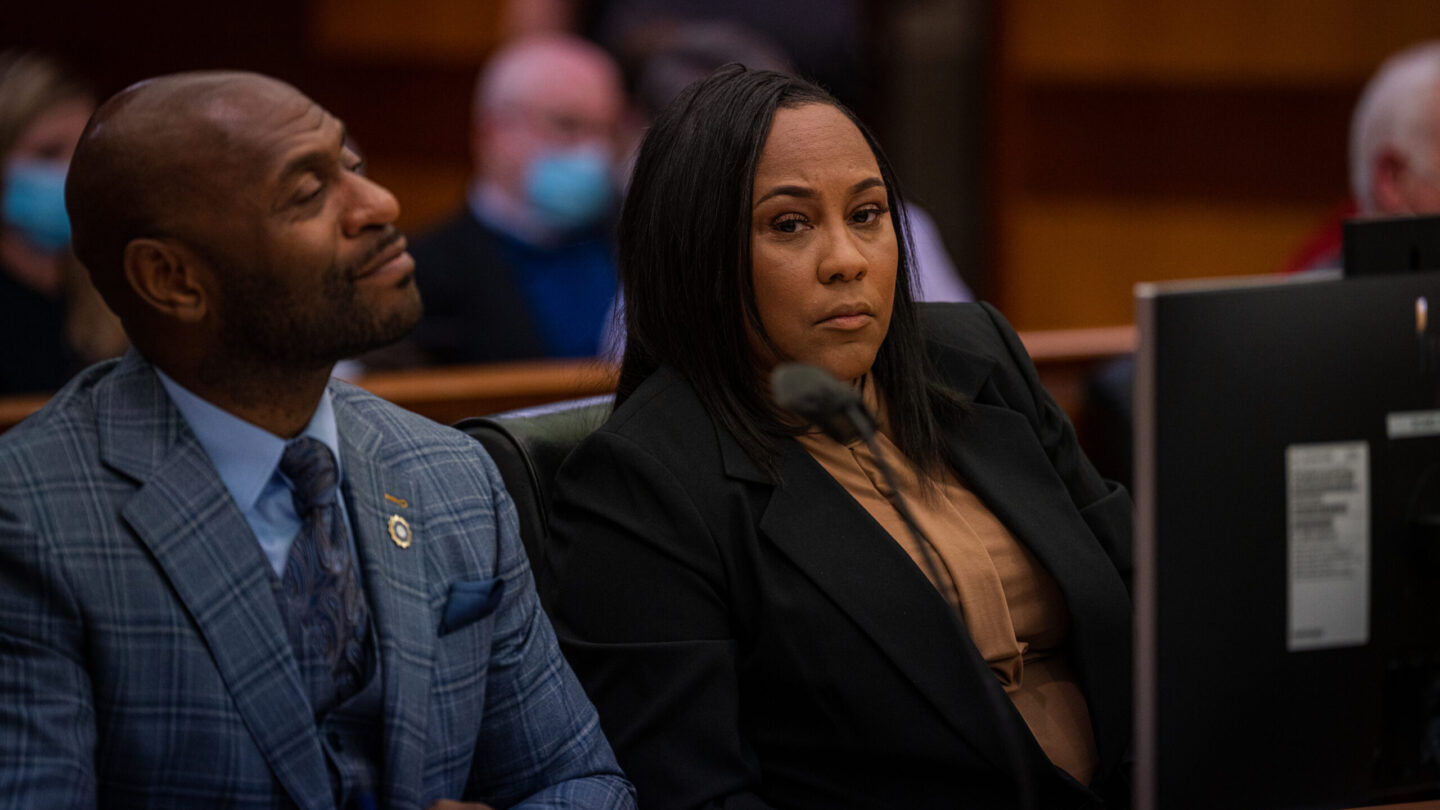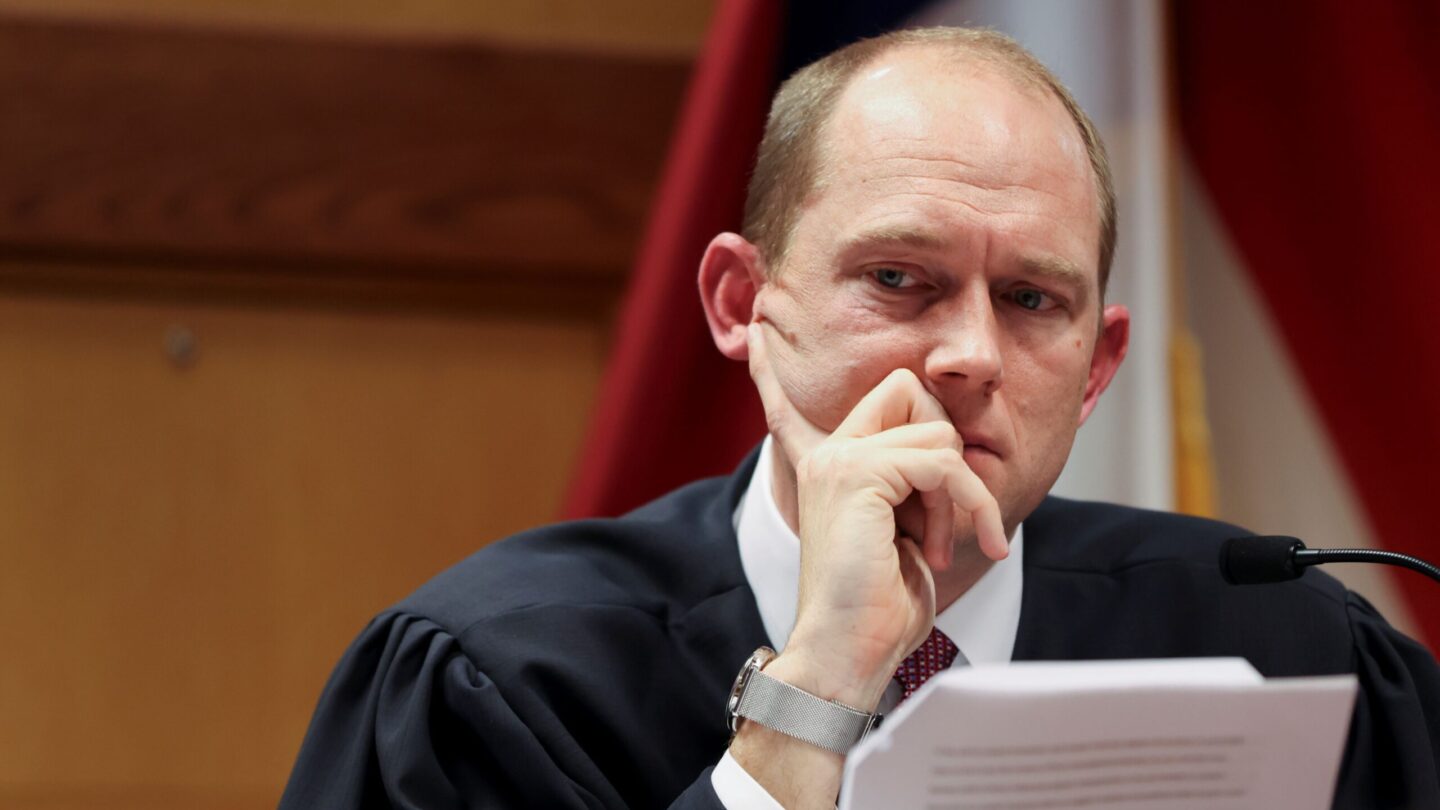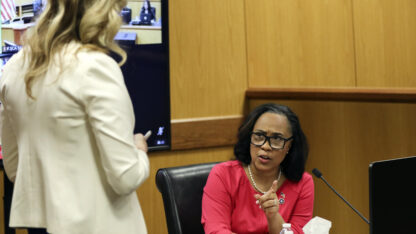Conflict of interest? DA Fani Willis faces judge to decide fate in Georgia election interference case

Fulton County District Attorney Fani Willis and Special Prosecutor Nathan Wade in court in January 2023. (Matthew Pearson/WABE)
Developing: A former friend of Fulton County District Attorney Fani Willis told a judge that Willis’ relationship with special prosecutor Nathan Wade began in 2019, before Willis hired Wade to help with the Georgia election case and earlier than Wade acknowledged in an affidavit.
Robin Yeartie, who also worked for the DA’s office and has not spoken with Willis since Yeartie resigned in 2022, said she had “no doubt” Willis was in a romantic relationship with Wade beginning in 2019 and said she witnessed them in social settings hugging and kissing. Wade is now on the stand.
Wade is now on the stand – and reiterated his earlier statement that the relationship began in 2022, specifically in March of that year. He also said that Willis reimbursed him for travel expenses in cash – and her insistence on paying her own way was sometimes a point of contention in their relationship.
Wade also testified that the romantic relationship with Willis ended by the summer of 2023. Pressed to back up his assertion that Willis reimbursed him in cash, Wade said he could not show any records of bank deposits for that money. Defense counsel also parsed invoices for Wade’s work for the Fulton County District Attorney’s Office and tried to poke holes in Wade’s assertion that the personal relationship with Willis did not begin until March 2022. The hearing is ongoing.
At roughly 3 p.m. on Thursday, Wade concluded his testimony. Willis is now on the stand.
Original story:
A judge in Georgia today will weigh whether Fulton County District Attorney Fani Willis should be disqualified from prosecuting the election interference case against former President Donald Trump and 14 others.
More than half of the remaining co-defendants facing criminal charges for alleged efforts to interfere with the 2020 election result, including Trump, are now accusing Willis of a conflict of interest and asking Fulton Superior Court Judge Scott McAfee to dismiss the charges against them.
“Because I think it’s possible that the facts alleged could result in disqualification, I think an evidentiary hearing must occur to establish the record on those core allegations,” McAfee said Monday.
Watch the hearing live here.
The misconduct allegations were first raised in January by co-defendant Michael Roman, a little-known operative employed by the Trump campaign in 2020 who is now facing seven felony charges.
Roman’s lawyer, Ashleigh Merchant, is accusing Willis and special prosecutor Nathan Wade of enriching themselves by funding vacation travel together with Wade’s hourly compensation from the case.
“The more money the special prosecutor makes, the more the district attorney gets to reap the financial benefits,” Merchant wrote in a filing. “These benefits are concrete, personal and financial. They are also at odds with the district attorney’s obligation to seek justice, which is why both the district attorney and special prosecutor will always labor under this conflict, regardless of when their relationship began.”
Fulton County prosecutors took weeks to formally address the allegations — acknowledging in a Feb. 2 filing a personal relationship between the two prosecutors, but one they said began after Willis hired Wade for the position in 2021.
“To be absolutely clear, the personal relationship between Special Prosecutor Wade and District Attorney Willis has never involved direct or indirect financial benefit to District Attorney Willis,” they wrote.
But since then, Roman and other defendants have filed a flurry of additional motions. Roman’s attorney accused prosecutors of not telling the truth about when Willis and Wade’s relationship started, promising to offer proof in court.
“Since Willis and Wade were not forthright about their relationship in the first instance, there is no reason to believe they are telling the truth now,” Merchant wrote in a reply motion. “These last-minute maneuvers have one purpose — to minimize the fallout.”
Trump’s Georgia lawyer, Steve Sadow, also accused Willis of wrongfully inserting “racial animus into this case to publicly denounce and rebuke the defendants” in a speech at Big Bethel AME Church in January.
In advance of Thursday’s hearing, Judge McAfee declined to quash subpoenas for the testimony of Willis, Wade and others, but pledged to limit the scope of the questioning — precluding additional discussion of allegations that Wade was underqualified for the job or that he was improperly appointed.
“What remains to be proven is the existence and extent of any financial benefit, if there even was one,” McAfee said on Monday.

What is a disqualifying conflict?
Georgia legal precedent has found that a conflict of interest exists when there is a “personal interest or stake in the defendant’s conviction.”
Some legal experts say that is not the case here. A group of more than a dozen law professors and former prosecutors filed a “friend of the court” brief earlier this month arguing the defendants have not established grounds for disqualifying Willis and Wade.
“Even if all defendants’ allegations are true, they do not mandate disqualification here,” the lawyers wrote. “Indeed, they do not even come close. As the Georgia disqualification cases show, prosecutors are trusted to discharge their duties impartially, even when they have conflicting interests that may generate an appearance of impropriety in the eyes of some.”
But there is some disagreement among legal scholars over exactly what standard the judge will use to weigh disqualification in the case. Clark Cunningham, a law professor who specializes in legal ethics at Georgia State University, says his read on the case law is that there is a lower bar for disqualification.
“If Judge McAfee finds that District Attorney Willis has a personal interest or stake in the prosecution of these defendants, he must disqualify her and the entire office, without the defendants having to make any showing that have been directly prejudiced by that personal interest,” says Cunningham.
At a hearing Monday, McAfee seemed to suggest that the appearance of a conflict may be enough to warrant disqualification.
“I think it’s clear that disqualification can occur if evidence is produced demonstrating an actual confidence or the appearance of one,” McAfee said.
Willis has already been disqualified from prosecuting one potential target of the election case.
Fulton Superior Judge Robert McBurney barred Willis from pursuing Burt Jones, one of Georgia’s so-called fake electors, after she hosted a fundraiser for his opponent in the race for lieutenant governor.
“An investigation of this significance, garnering the public attention it necessarily does and touching so many political nerves in our society, cannot be burdened by legitimate doubts about the district attorney’s motives,” McBurney wrote at the time.

The stakes of Judge McAfee’s decision
If Willis is disqualified, the entire Fulton DA’s office would also be taken off the election interference case. The director of the Prosecuting Attorneys Council of Georgia then would have to appoint a special prosecutor to take over the case.
But for context, 18 months after a judge disqualified the Fulton DA’s office from investigating the lieutenant governor, no prosecutor has been appointed to resume the case.
So the outcome of this latest disqualification effort could affect whether the Georgia election case goes to trial this year at all.
“Judge McAfee’s decision will potentially change American history,” Cunningham says.
However, Cunningham warns that the Georgia case could now be derailed regardless of McAfee’s ruling, given the possibility that appeals to his decision have the potential to delay the case significantly.
McAfee has yet to set a trial date, largely due to Trump’s complicated legal calendar as he faces criminal charges in multiple cases.
Fulton County prosecutors had been eyeing an August trial. But with Trump’s federal trial delayed as the U.S. Supreme Court weighs hearing the former president’s claim of absolute immunity from criminal prosecution, the timing of that decision will have ripple effects in Georgia.
Norm Eisen, a legal scholar tracking the cases from his perch at the Brookings Institution, believes the cases could be tried in succession, since Trump has different legal teams representing him in each case. Eisen says he thinks the Georgia case could start right after the federal trial ends without much buffer.
That would suggest a September trial in Georgia — likely at the earliest.








